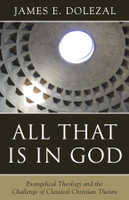
Dolezal, James
All That Is in God: Evangelical Theology and the Challenge of Classical Christian Theism (Dolezal)
“Very few volumes of theology have stirred my profound intrigue as James Dolezal’s All That Is in God. The book describes the heart of classical theology in its brilliant defense of the catholic view of the nature and character of God. . . A must read.” —R.C. Sproul
Description
Unknown to many, increasing numbers of conservative evangelicals are denying basic tenets of classical Christian teaching about God, with departures occurring even among those of the Calvinistic persuasion. James E. Dolezal’s All That Is in God provides an exposition of the historic Christian position while engaging with these contemporary deviations.
His convincing critique of the newer position he styles “theistic mutualism” is philosophically robust, systematically nuanced, and biblically based. It demonstrates the need to maintain the traditional viewpoint, particularly on divine simplicity, and spotlights the unfortunate implications for other important Christian doctrines—such as divine eternality and the Trinity—if it were to be abandoned. Arguing carefully and cogently that “all that is in God is God Himself,” the work is sure to stimulate debate on the issue in years to come.
Contents
Foreword
Preface
Acknowledgements
Bibliography
Index
Endorsements
“All That Is in God: Evangelical Theology and the Challenge of Classical Christian Theism offers an exceptionally clear, concise, and compelling presentation of what, until recently, catholic Christians have believed and confessed regarding the being and perfection of the triune God. It also offers incisive analysis of much contemporary evangelical teaching about God, concluding that both conservative and progressive ‘theistic mutualists’ share common assumptions and fallacies regarding the being and activity of God. I know of no other contemporary book that makes both of these contributions together in one place, and certainly not with the degree of clarity, charity, and persuasiveness that Dolezal’s book exhibits. A worthy book that deserves a wide readership!”
—Scott R. Swain, President and James Woodrow Hassell Professor of Systematic Theology, Reformed Theological Seminary in Orlando
—J. V. Fesko, Professor of Systematic and Historical Theology, Westminster Seminary California
“All That Is in God is a fine sequel to the author’s God without Parts (2011). The chapters provide an excellent guide to the main contours of classical theism. Dr. Dolezal also sounds a timely warning to those who have been tempted to modify this theism in the interests of what he aptly calls ‘theistic mutualism.’ The result is an excellent, up-to-date reminder of the Christian doctrine of God as understood by the conciliar statements and by the mainstream Reformed confessions.”
—Paul Helm, Teaching Fellow, Regent College
“This is a significant book on a topic that could hardly be more important. What we believe about the nature of God matters, and we dare not risk having an underdeveloped or sub-biblical understanding of such a central Christian concern. To put it as plainly as possible: I want every one of our students to read this book and to reflect deeply on its teachings, since what Dolezal seeks to explain is nothing less than the historic doctrine of the Christian church.”
—Jonathan L. Master, Professor of Theology and Dean of the School of Divinity, Cairn University
“This is an important book. It deserves close attention from teachers, pastors, and students, indeed, from anyone confronted by the confused mass of misleading theologies put forth today under the guise of new and relevant reconstructions of the evangelical and Reformed faith.”
—from the foreword by Richard A. Muller, P. J. Zondervan Professor of Historical Theology, Emeritus, Calvin Theological Seminary
About the Author
James E. Dolezal is Assistant Professor of Theology in the School of Divinity at Cairn University, Langhorne, Pennsylvania.